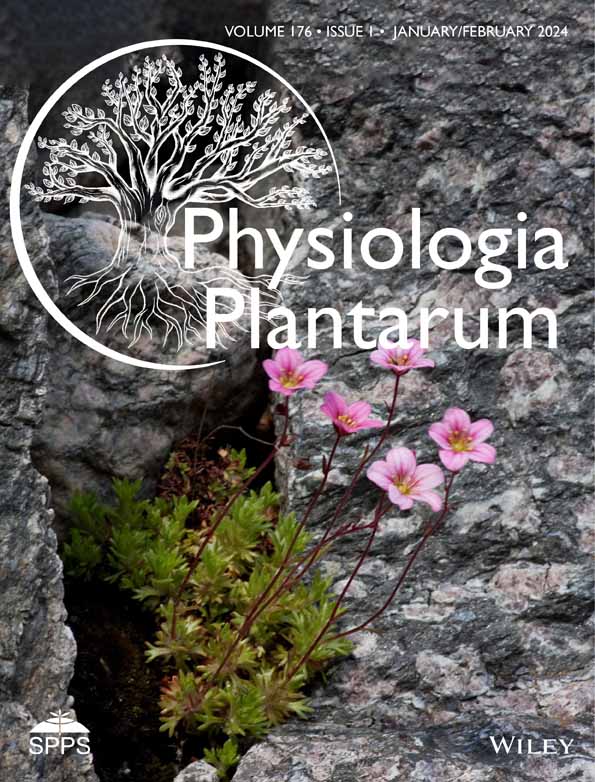Glycine betaine: A multifaceted protectant against salt stress in Indian mustard through ionic homeostasis, ROS scavenging and osmotic regulation
IF 5.4
2区 生物学
Q1 PLANT SCIENCES
引用次数: 0
Abstract
Salt stress is a prevalent environmental issue that disrupts the redox balance and metabolic processes in plants, leading to reduced crop growth and productivity. Currently, over 6.74 million hectares in India are salt‐affected, and about 75% of this land lies in states that are the major cultivators of edible oilseed crops (rapeseed‐mustard). Therefore, this study focused on the efficacy of glycine betaine (GB) supplementation in mitigating the detrimental effects of salt stress in甘氨酸甜菜碱:通过离子平衡、清除 ROS 和调节渗透压,从多方面保护印度芥菜免受盐胁迫的影响
盐胁迫是一个普遍存在的环境问题,它会破坏植物体内的氧化还原平衡和新陈代谢过程,导致作物生长和产量下降。目前,印度有超过 674 万公顷的土地受盐分影响,其中约 75% 的土地位于主要种植食用油籽作物(油菜籽-芥菜)的邦。因此,本研究重点关注甘氨酸甜菜碱(GB)补充剂在减轻盐胁迫对芸薹属植物(印度芥菜)的有害影响方面的功效。印度芥菜植株在播种后 20 天(DAS)受到盐胁迫[0、50、100 和 150 毫摩尔氯化钠],同时在 50 和 70 DAS 时叶面喷洒 20 毫摩尔 GB。数据显示,盐胁迫会显著增加脂质过氧化、离子毒性、细胞死亡、电解质渗漏和活性氧积累,引发氧化应激,从而大幅降低生长、光合速率、膜稳定性和产量。补充 20 毫摩尔的 GB 能使植物耐受盐引起的毒性,因为它大大提高了植物的生长、生物量、含水量、养分吸收和光合效率。此外,GB 还能促进渗透溶质的积累,增强抗氧化防御系统,改善离子平衡,提高细胞活力。总之,所获得的数据使人们对施用外源 GB 的有益作用有了更深入的了解,这种作用可用于生物技术,以增强作物在挑战性环境中的抗逆性。
本文章由计算机程序翻译,如有差异,请以英文原文为准。
求助全文
约1分钟内获得全文
求助全文
来源期刊

Physiologia plantarum
生物-植物科学
CiteScore
11.00
自引率
3.10%
发文量
224
审稿时长
3.9 months
期刊介绍:
Physiologia Plantarum is an international journal committed to publishing the best full-length original research papers that advance our understanding of primary mechanisms of plant development, growth and productivity as well as plant interactions with the biotic and abiotic environment. All organisational levels of experimental plant biology – from molecular and cell biology, biochemistry and biophysics to ecophysiology and global change biology – fall within the scope of the journal. The content is distributed between 5 main subject areas supervised by Subject Editors specialised in the respective domain: (1) biochemistry and metabolism, (2) ecophysiology, stress and adaptation, (3) uptake, transport and assimilation, (4) development, growth and differentiation, (5) photobiology and photosynthesis.
 求助内容:
求助内容: 应助结果提醒方式:
应助结果提醒方式:


